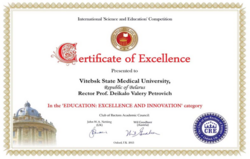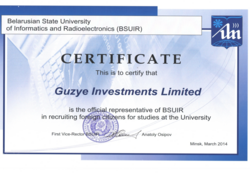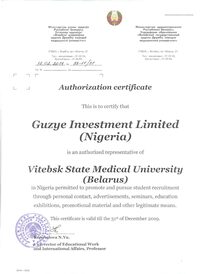Study Medicine
The Medical Universities has the following faculties
-
Faculty of General medicine
- Pharmaceutical
- Stomatological
- Advanced Training in Pedagogies and Psychology
STUDY AT THE SCHOOL OF ENVIRONMENTAL SCEINCE
The Faculty of Environmental Monitoring and Environmental Medicine
Personnel training, education and public awareness of environmental problems are the main factors for the transition of different countries to the sustainable development and to the problem solving of the future human survival. Nowadays it is common knowledge that people who take management decisions, as well as a considerable part of population should have appropriate environmental knowledge. Environmental education is a part of the united triad "Environmental upbringing - environmental awareness-building - environmental education", which forms ecological world outlook of the population to realize the perception of optimal human environmental conditions necessity at the global, regional and local levels.
In this regard, the mission of the Faculty of Environmental Monitoring is to contribute to a specialist, who feels responsibility for the environmental conditions, improving his professionalism based on deep knowledge, innovative thinking, and eco-friendly technologies.
Departments:
The Department of Nuclear and Radiation Safety
The Department of Energy Efficient Technologies
The Department of Environmental Monitoring
The Department of Environmental Management
The Department of Environmental Information Systems
The Department of Data Processing Automated Systems
The Department of Physics and Higher Mathematics
The Department of Philosophy, Sociology and Economics
In accordance with the international status of the university its students get profound knowledge in English and another foreign language (they may choose from German, Spanish and French), that lets them communicate with the specialists of other countries in a professional way and use foreign literature.
The departments educational programs include traditional modes of educational process: lectures, seminars, reports, news items as well as up-to-date methods of learning (interactive and training modes of learning); business games and role playing, cooperative groups, field experience, excursions to the top institutes, visits to industrial, administrative, consulting and social organizations. For gaining practical skills students undergo practical training at educational research complex "International Ecological park "Volma" and regional educational information center over the radiation safety issues "Hojniki". Practical training is held in the laboratories of National Academy of Science, branch institutes and industrial enterprises. On graduating from the university the students can continue their education and they are offered an MA course and a postgraduate course.
Multifunctional training of the graduates of the Department of environment monitoring allows to analyze the state of the environmental and ecological information at the high level as well as to use various hardware and software tools of information science, methods of mathematical simulation, analysis and forecast of the state of natural objects for solving professional problems.
The undergraduate diploma(degree) is recognized as sufficient for joining MA course in different universities of a whole number of foreign countries. The department renders assistance to the graduates in job placement, offering working places in acquired professions according to the demand of organizations concerned. Department graduates work in different research institutes, expert and analytical organizations, monitoring authorities and natural environment quality control, environmental services of enterprises, departments of information system automation of various institutions. They are employed in the capacity of researchers, engineering and administrative staff in institutes of higher education and establishments of specialized secondary education.
The Faculty of Environmental Medicine
Today the faculty consists of 8 departments and 8 academic laboratories, 5 research laboratories:
Their scope of activities covers different directions of modern biology and medicine, which corresponds to scientific directions of the chairs. More than 80 % of the Faculty’s staff have PhD degrees in biology, chemistry or medicine
Departments
Department of Environmental Medicine and Radiobiology
Department of Immunology
Department of Human Biology and Ecology
Department of Biochemistry and Biophysics
Department of Environmental and Molecular Genetics
Department of Radiation Hygiene and Epidemiology
Biocenology (qualification: Biologist-Ecologist.)
Medical ecology (qualification: Expert of Ecology)
The faculty trains specialists in the field of medical and biological sciences. Main scientific activities are concentrated on studying the influence of biotic and non-biotic environmental factors on the state of cells, tissues of all living organisms? systems (cardiovascular, nervous, endocrine, immune and others). It provides the opportunity to students to study diagnosis methods of different types of pathology, assessment of treating effectiveness, search of molecular markers of environmental factors? influence on organisms.
Students of the Faculty pass practical training at the equipped laboratories of the University and at city hospitals, clinical and scientific- research laboratories, at the institutes of the National Academy of Sciences of Belarus, at clinical and scientific-research institutes of the Ministry of Health and other organizations as well.
Field summer practical training in ecology (the 1st year) plays a great role in the environmental and medical outlook formation. It is carried out at the training-research station "Volma", at Central Botany Garden of Belarus National Academy of Sciences and at surroundings of Minsk. Besides, the students also have summer practical training according to the program of junior and intermediate medical staff at hospitals (the 2nd year) and practical training on their specialization (the 3rd year). The students pass their professional practice while writing a diploma paper at the place of their future activities.
The Department of Radiation Hygiene and Epidemiology was created on September 1999. The chair provides training in specialty "Medical Ecology". Graduates are given a qualification "Ecologist, Teacher of ecology". Modular system, which serves as a ground for training process, is dynamic and allows timely and flexibly react to modern requirements of practical health. Training process is arranged in accordance with international standards. Most classes take place in computer rooms equipped with the modern computers.
The students having been trained at the Department receive not only theoretical knowledge meeting the requirements of the practical health care (i.e. they study theory of risk estimate for man-caused and radionuclide contamination of the environment, components of which is only partially introduced to the health care), but also skills of practical work with modern statistical software (SPSS, S+, R+, Statistical etc.), and updated analytical data plotters geo information systems.
Currently the department is a structural unit of the International Center of Excellence for Anthrop ecology and Public Health, which is the base for post-graduate training in epidemiology, public health, and bioethics integrated with corresponding programs of The Great Lakes Center for Global Environmental and Occupational Health at the University of Illinois at Chicago (GLCGEOH), USA.





